|
|
|
Sort Order |
|
|
|
Items / Page
|
|
|
|
|
|
|
| Srl | Item |
| 1 |
ID:
107939
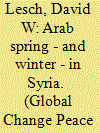

|
|
|
| 2 |
ID:
107937
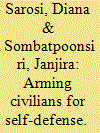

|
|
|
|
|
| Publication |
2011.
|
| Summary/Abstract |
This paper examines the supply and demand sides of firearms proliferation and highlights the negative impacts they have on the security of the civilian population and communal relations in the conflict-affected region of Southern Thailand. Based on information gathered during focus group discussions and in-depth interviews, the article argues that firearms proliferation and the creation of civilian militias in Southern Thailand have spawned a flourishing gun economy that is exacerbating religious and ethnic polarization and communal violence. As a result, social ties are breaking down and ethno-religious discrimination is intensifying. Without a reduction in the militarization of civilians, the conflict in Southern Thailand is likely to become deeply entrenched as has happened in other violent conflicts. The paper is organized in three sections. The first section examines firearms supply in Southern Thailand. The second investigates the way in which the supply corresponds with the general demand for firearms. Finally, an analysis of the impacts of firearms proliferation and the arming of civilians is presented.
|
|
|
|
|
|
|
|
|
|
|
|
|
|
|
|
| 3 |
ID:
107931
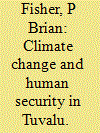

|
|
|
|
|
| Publication |
2011.
|
| Summary/Abstract |
At the local level, global climate change is exacerbating current environmental conditions while creating entirely new environmental and human hazards. The thesis of this article is that these new threats merge with preexisting vulnerabilities, creating a hybridized force that ripples through every aspect of society and threatens human security. The vulnerabilities intensify as these communities lack the adaptive and developmental capacity to address the multifarious effects, further undermining their human security. This article examines the case of the Funafuti, Tuvalu, and the effect of a warming Southern Pacific Ocean on Tuvaluan societal structural flows and processes. As the case demonstrates, climate change becomes more than an environmental issue; rather, it is a global social problem bound by multiple human security issues. For extremely vulnerable countries like Tuvalu, the case suggests that a human security approach best captures the dynamics of climate impacts in vulnerable communities, and, as such, requires adjustments in the global climate regime's current approach. This conclusion also represents a challenge to current scholarship which suggests that the small islands will be uninhabitable simply from sea level rise.
|
|
|
|
|
|
|
|
|
|
|
|
|
|
|
|
| 4 |
ID:
107940


|
|
|
| 5 |
ID:
107938


|
|
|
|
|
| Publication |
2011.
|
| Summary/Abstract |
Using Cambodia as a case study, this article takes an anthropological stance to explore how the penetration of global neoliberal values impacts upon understandings of moral order and thereby influences gender-based violence in war-torn societies. It argues that the International Monetary Fund's structural adjustment programmes and radical free-market reforms affect not only the politico-economic climate but also moral, social and cosmological order. This can generate fears about the decay of 'culture' and, since female propriety is often equated with national virtue, the female body may then be subjected to intense policing and violent disciplining. The article describes how some Cambodian women are responding to violations by seeking moral rehabilitation in the Buddhist temple. Although the patriarchal structure of the temple may seem to be anything but empowering for women, religious participation by violated women makes cultural sense. The material presented here therefore challenges us to consider whether Cambodia's brutal history and supposedly misogynistic culture is experienced as the greatest threat for vulnerable women today, or whether it is the absorption of war-torn societies by the global system, and the cultural disintegration this is felt to engender, that is the more pernicious factor.
|
|
|
|
|
|
|
|
|
|
|
|
|
|
|
|
| 6 |
ID:
107935
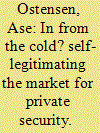

|
|
|
|
|
| Publication |
2011.
|
| Summary/Abstract |
Private military and security companies have gained political authority within the governance of security, but the increasing authority seems unmatched by legitimacy. This article analyzes self-legitimation efforts by the dominant Western industry. It draws on two different theoretical perspectives of legitimacy, organizational legitimacy and democratic legitimacy, and argues that four dimensions of legitimacy are relevant to these companies. The article finds empirically that there are different degrees of deficits in each dimension and discusses the use of some corresponding legitimating strategies used by the industry. Findings indicate that much effort currently seems concentrated on building input legitimacy, while there are also less concerted efforts to cultivate both output and moral legitimacy. The article warns that, if unchallenged, legitimation campaigns may lead to further accumulation of private influence on military and security policies, both nationally and internationally.
|
|
|
|
|
|
|
|
|
|
|
|
|
|
|
|
| 7 |
ID:
107933
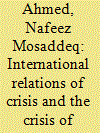

|
|
|
|
|
| Publication |
2011.
|
| Summary/Abstract |
The twenty-first century heralds the unprecedented acceleration and convergence of multiple, interconnected global crises - climate change, energy depletion, food scarcity, and economic instability. While the structure of global economic activity is driving the unsustainable depletion of hydrocarbon and other natural resources, this is simultaneously escalating greenhouse gas emissions resulting in global warming. Both global warming and energy shocks are impacting detrimentally on global industrial food production, as well as on global financial and economic instability. Conventional policy responses toward the intensification of these crises have been decidedly inadequate because scholars and practitioners largely view them as separate processes. Yet increasing evidence shows they are deeply interwoven manifestations of a global political economy that has breached the limits of the wider environmental and natural resource systems in which it is embedded. In this context, orthodox IR's flawed diagnoses of global crises lead inexorably to their 'securitisation', reifying the militarisation of policy responses, and naturalising the proliferation of violent conflicts. Global ecological, energy and economic crises are thus directly linked to the 'Otherisation' of social groups and problematisation of strategic regions considered pivotal for the global political economy. Yet this relationship between global crises and conflict is not necessary or essential, but a function of a wider epistemological failure to holistically interrogate their structural and systemic causes.
|
|
|
|
|
|
|
|
|
|
|
|
|
|
|
|
| 8 |
ID:
107932
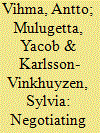

|
|
|
|
|
| Publication |
2011.
|
| Summary/Abstract |
The negotiating group of developing countries, the G77, is one of the most important institutions in global climate governance. This article analyses the cohesiveness of, and internal tension within, the G77 coalition by using the politics of climate change as the empirical window. The study examines four arenas of UN-based deliberations on climate change in the years 2007-2010; the Security Council, the Commission on Sustainable Development, the General Assembly and the United Nations Framework Convention on Climate Change (UNFCCC). We argue that these deliberations, once they reached the top of the international political agenda in 2007, and ever since, have posed deeper challenges to the G77 coalition than ever before. While developing country interests are both converging and diverging, the increasingly conflicting interests, as well as the very slowly eroding common identity, are creating increasingly unified subgroups in the G77. The G77 is highly unlikely to break up formally, but how functional it will be as a bloc in the forthcoming climate change negotiations remains an open question.
|
|
|
|
|
|
|
|
|
|
|
|
|
|
|
|
| 9 |
ID:
107934


|
|
|
|
|
| Publication |
2011.
|
| Summary/Abstract |
There is a growing body of literature dedicated to critiquing liberal peacebuilding. This paper revisits the current post-conflict peacebuilding agenda in light of these critiques, outlining how both proponents and opponents perceive three core principles, that is, democratisation, economic liberalisation and state-building. Drawing attention to the emergence of arguments for alternative approaches, this paper argues that recent developments provide some hope for reconciling proponents of the liberal agenda with their growing legion of critics.
|
|
|
|
|
|
|
|
|
|
|
|
|
|
|
|
|
|
|
|
|